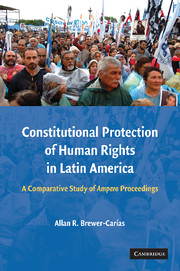 Constitutional Protection of Human Rights in Latin America
Constitutional Protection of Human Rights in Latin America Book contents
- Frontmatter
- Contents
- INTRODUCTION
- PART ONE THE CONSTITUTIONAL AND INTERNATIONAL DECLARATION OF HUMAN RIGHTS AND ITS JUDICIAL GUARANTIES
- PART TWO THE AMPARO AS A LATIN AMERICAN CONSTITUTIONAL AND INTERNATIONAL LAW INSTITUTION
- PART THREE THE INJURED PARTY AND THE CONSTITUTIONAL RIGHTS PROTECTED BY MEANS OF THE AMPARO PROCEEDING
- PART FOUR THE INJURY, THE INJURING PARTY AND THE INJURING ACTS OR OMISSIONS IN THE AMPARO PROCEEDING
- PART FIVE THE EXTRAORDINARY CHARACTER OF THE AMPARO PROCEEDING
- CONCLUSION
- APPENDIX A List of Latin American Constitutions
- APPENDIX B List of Latin American Amparo Laws (Statutes)
- INDEX
PART FOUR - THE INJURY, THE INJURING PARTY AND THE INJURING ACTS OR OMISSIONS IN THE AMPARO PROCEEDING
Published online by Cambridge University Press: 08 August 2009
- Frontmatter
- Contents
- INTRODUCTION
- PART ONE THE CONSTITUTIONAL AND INTERNATIONAL DECLARATION OF HUMAN RIGHTS AND ITS JUDICIAL GUARANTIES
- PART TWO THE AMPARO AS A LATIN AMERICAN CONSTITUTIONAL AND INTERNATIONAL LAW INSTITUTION
- PART THREE THE INJURED PARTY AND THE CONSTITUTIONAL RIGHTS PROTECTED BY MEANS OF THE AMPARO PROCEEDING
- PART FOUR THE INJURY, THE INJURING PARTY AND THE INJURING ACTS OR OMISSIONS IN THE AMPARO PROCEEDING
- PART FIVE THE EXTRAORDINARY CHARACTER OF THE AMPARO PROCEEDING
- CONCLUSION
- APPENDIX A List of Latin American Constitutions
- APPENDIX B List of Latin American Amparo Laws (Statutes)
- INDEX
Summary
The injuries violating constitutional rights, against which the amparo action has been established in Latin America, can consist of harms or threats affecting those rights.
Harms are always damages affecting or destroying the object of the right; and threats are injuries that, without destroying such object, put the enjoyment of the right in a situation of danger or of suffering a decrease.
These injuries –harms or threats– caused to constitutional rights, in order to be protected by means of the amparo proceeding, must fulfill a series of conditions that are commonly established in the Amparo Laws, as conditions for the admissibility of the action.
In general terms, it is accepted that the injury –whether harms or threats– must be evident, actual and real, that is, it must affect personally and directly the rights of the plaintiff, in a manifestly arbitrary, illegal and illegitimate way, which the plaintiff must not have consented.
Yet in addition to these general conditions, specifically regarding harms, they must have a reparable character; and regarding threats, they must affect the rights in an imminent way. That is why the type of injuries inflicted on constitutional rights, conditions the purpose of the amparo proceeding: if harms, being reparable, the amparo has a restorative effect; and if threats, being imminent, the amparo has a preventive effect.
This section of the book is devoted to analyze, separately, all these general and specific conditions of the injuries, which are at the same time, conditions of admissibility of the amparo action.
- Type
- Chapter
- Information
- Constitutional Protection of Human Rights in Latin AmericaA Comparative Study of Amparo Proceedings, pp. 259 - 260Publisher: Cambridge University PressPrint publication year: 2008


